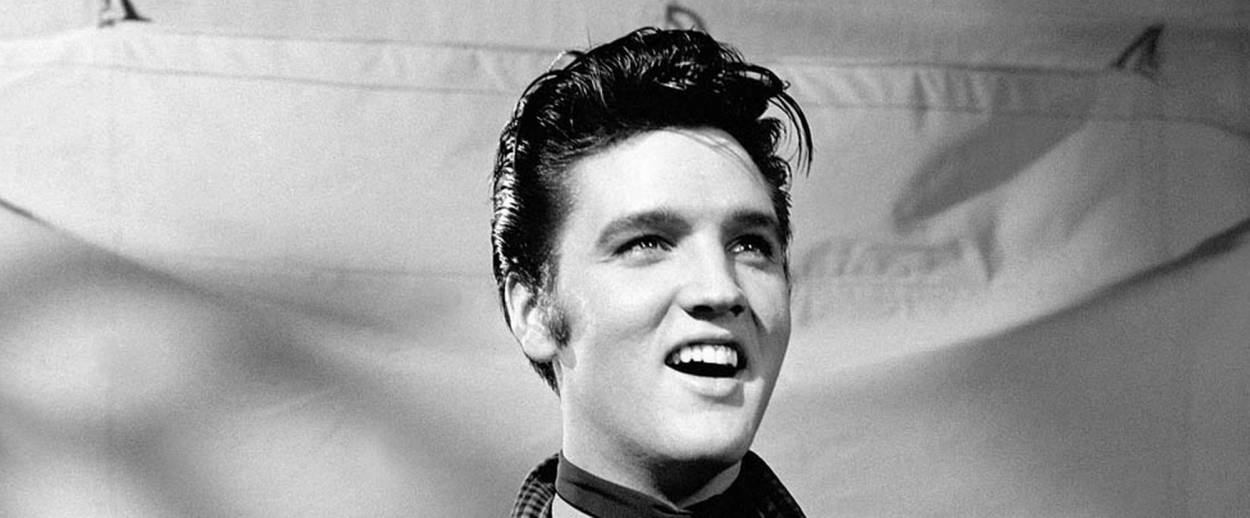Remembering Elvis Presley
A look at Tablet’s coverage of The King, on the 38th anniversary his death




On August 16, 1977, Elvis Presley, the king of rock ‘n’ roll died at the age of 42. This Sunday marks the 38th anniversary of his death.
This past week was Elvis Week at his Graceland home in Memphis, Tennessee, an annual occurrence that commemorates the death of the musical icon. On Thursday, an auction was held at Presley’s hometown and final resting place, in which over 170 items were sold, including a pendant Presley gave to Sammy Davis, Jr. (sold for $32,000) and a handgun Presley personally owned ($96,000).
A memoir penned by Presley’s private nurse, Letetia Henley Kirk, was also released this week. Kirk lived at Presley’s home in Graceland from 1972 and 1983 and even went on tour with him. The book is reportedly an intimate portrayal of the late great rock star, consisting of a collection of stories about Kirk’s life and experiences around Presley and his family.
“He was not only my patient, but a good friend,” Kirk, now 73, told USA Today. “That’s why I didn’t want to write a book all these years. I felt like he wouldn’t have written a book about me if it had been the other way around.”
An “Elvis Presley forever” postage stamp will also be available for purchase nationwide, which includes a monochrome image of the singer in his youth, emblazoned with his signature in golden letters.
If that doesn’t satiate your thirst for The King then you should check out our coverage of Elvis Presley over the years:
Vox Tablet also featured Harold Fruchter, a Jewish wedding band singer who grew up in the apartment above the Presley’s 462 Alabama Avenue flat in Memphis in the fifties, in a segment that first aired on KCRW’s UnFictional, produced by Rob Sachs, with help from Bob Carlson. Elvis was then just a teenager, and the Fruchters and the Presleys developed a close friendship, with Elvis “learning to pick up the cues when the Fruchters needed someone to turn on a light or unlock a door on Shabbos.”
It’s also worth checking out this Scroll post from Tablet contributor Adam Chandler, in which he outlines why Elvis fans consider The King to be a Jew.
Writing about Elvis in Rolling Stone, Bono, the lead singer of U2, explained:
Jerry Schilling, the only one of the Memphis Mafia not to sell him out, told me a story about when he used to live at Graceland, down by the squash courts. He had a little room there, and he said that when Elvis was upset and feeling out of kilter, he would leave the big house and go down to his little gym, where there was a piano. With no one else around, his choice would always be gospel, losing and finding himself in the old spirituals. He was happiest when he was singing his way back to spiritual safety. But he didn’t stay long enough. Self-loathing was waiting back up at the house, where Elvis was seen shooting at his TV screens, the Bible open beside him at St. Paul’s great ode to love, Corinthians 13. Elvis clearly didn’t believe God’s grace was amazing enough.
Chandler goes on to describe the fact that that “Elvis Presley, by matrilineal descent, was halakhically Jewish,” according to his nomination for induction into the Jewish-American Hall of Fame.
And, finally, if you’re not quite Elvis-ed out, check out Big Mama Thornton’s version of Jerry Leiber and Mike Stoller’s “Hound Dog,” which Tablet contributor Liel Liebowitz argues is the definitive version.
Previous: Nothin’ But a Houngdog
Elvis Presley Jewish King of Rock
VoxVault: Elvis Was Our Shabbos Goy
Jas Chana is a former intern at Tablet.